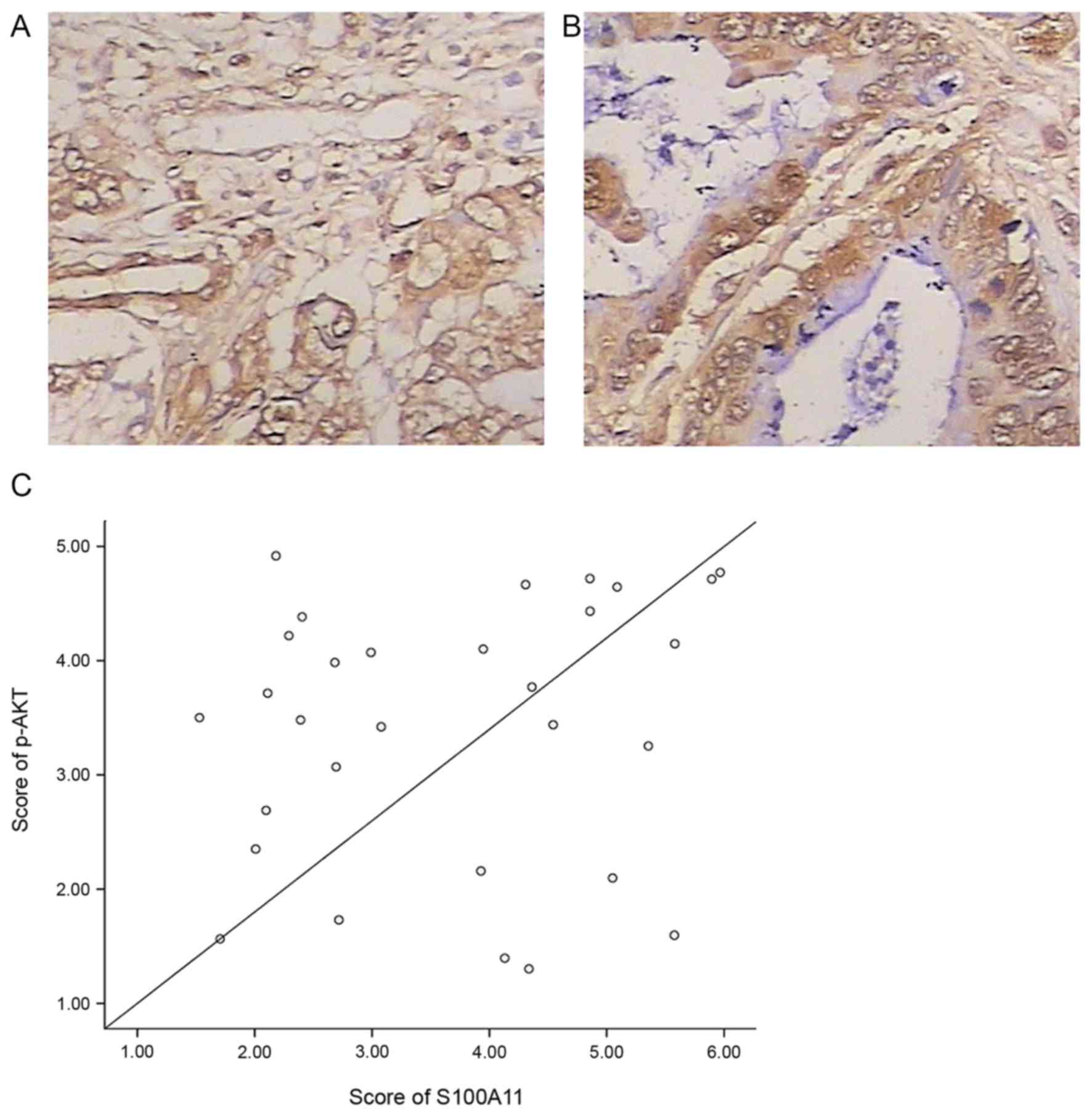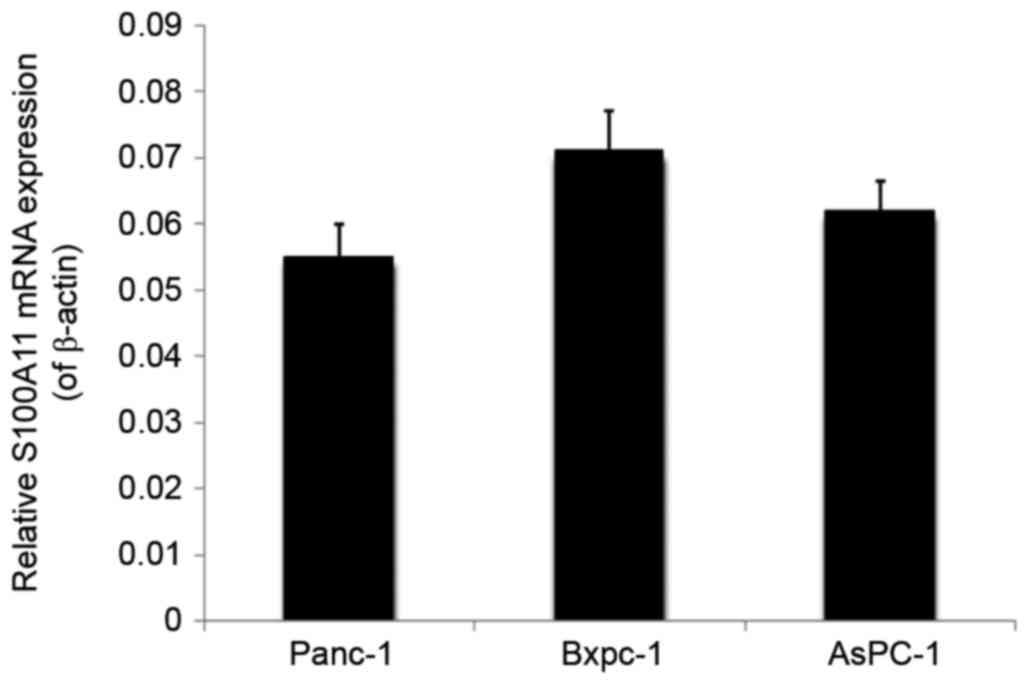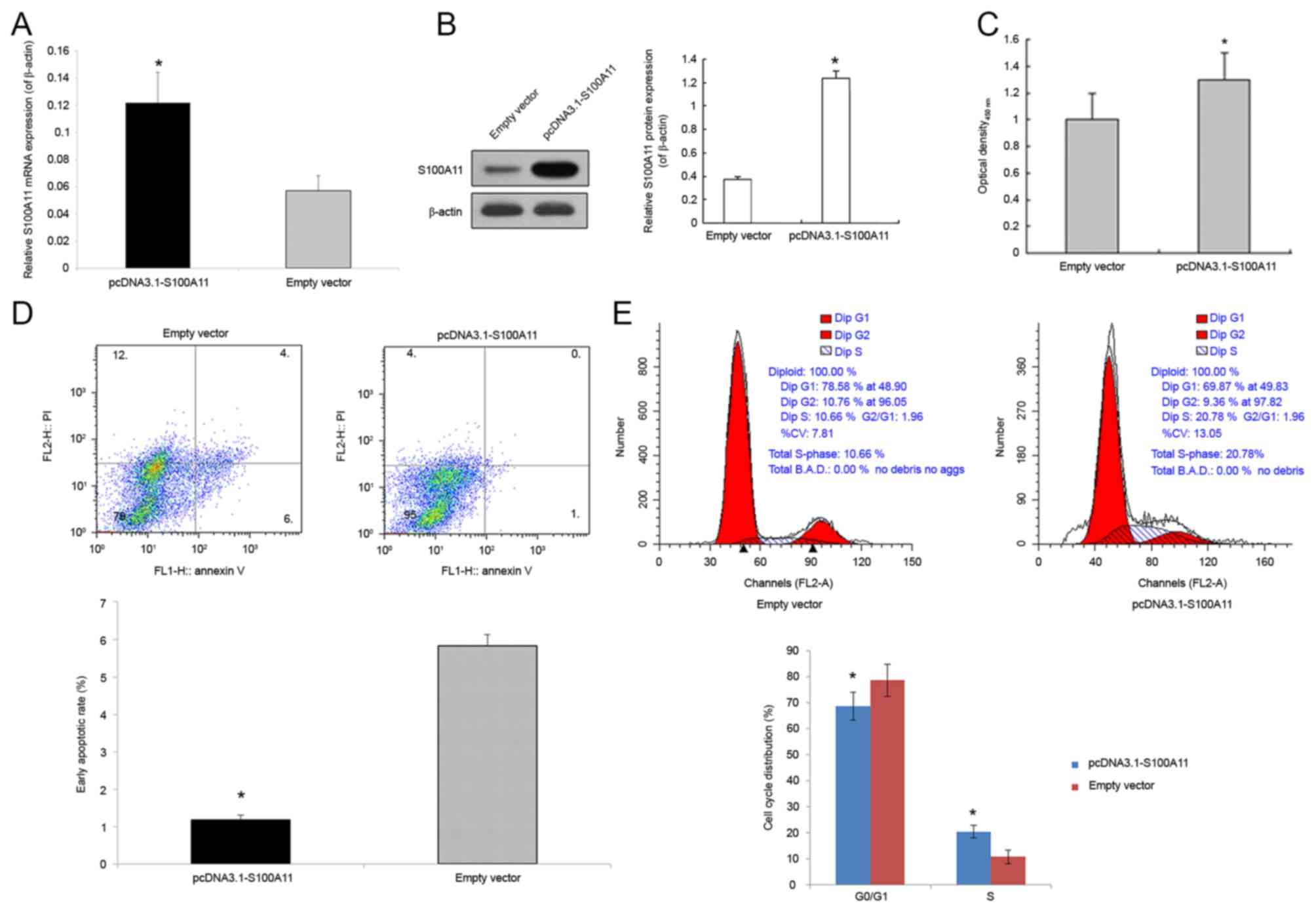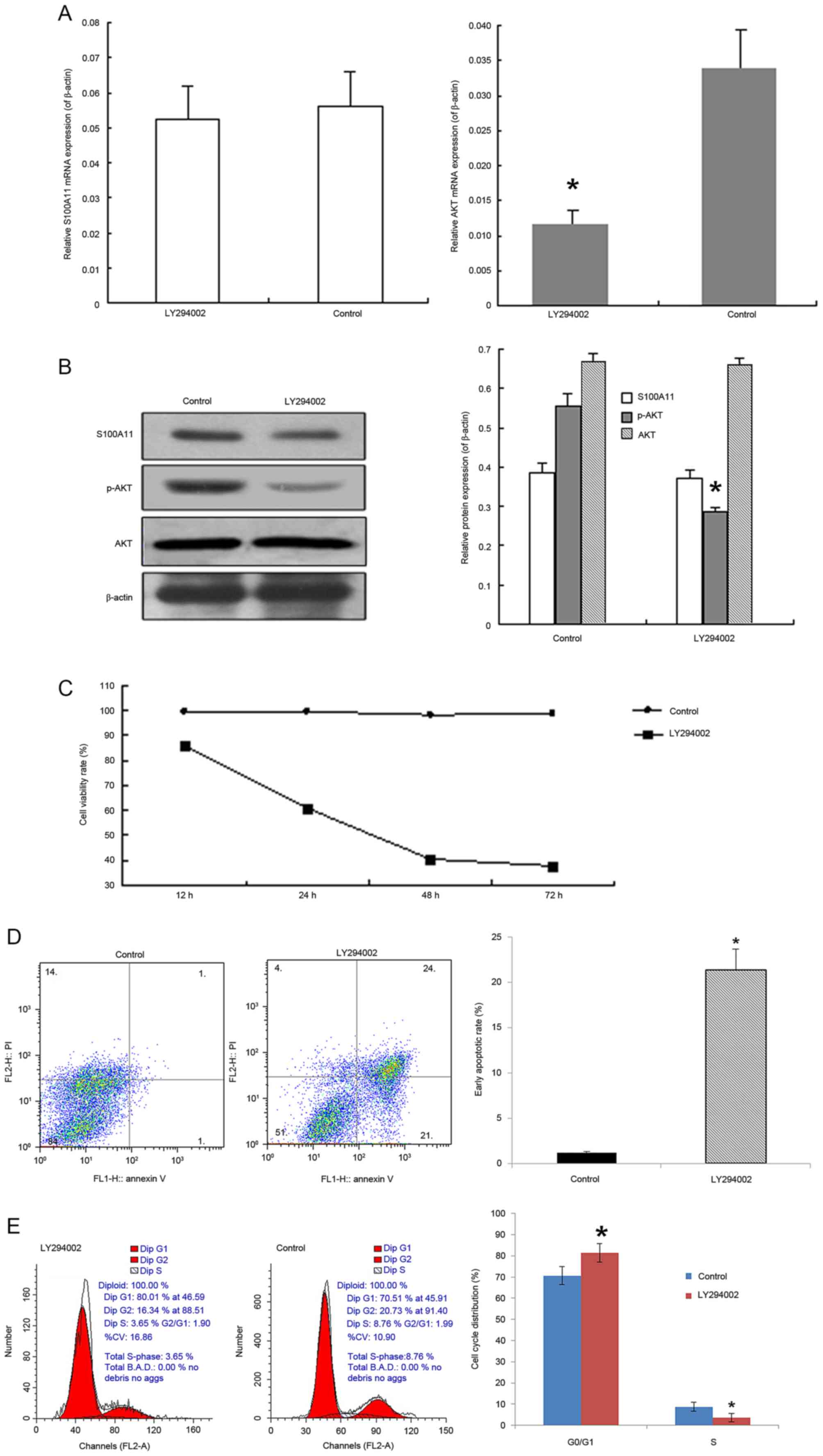|
1
|
Ryan DP, Hong TS and Bardeesy N:
Pancreatic adenocarcinoma. N Engl J Med. 371:1039–1049. 2014.
View Article : Google Scholar : PubMed/NCBI
|
|
2
|
Zell JA, Rhee JM, Ziogas A, Lipkin SM and
Anton-Culver H: Race, socioeconomic status, treatment and survival
time among pancreatic cancer cases in California. Cancer Epidemiol
Biomarkers Prev. 16:546–552. 2007. View Article : Google Scholar : PubMed/NCBI
|
|
3
|
Lau MK, Davila JA and Shaib YH: Incidence
and survival of pancreatic head and body and tail cancers: A
population-based study in the United States. Pancreas. 39:458–462.
2010. View Article : Google Scholar : PubMed/NCBI
|
|
4
|
Quaresma M, Coleman MP and Rachet B:
40-year trends in an index of survival for all cancers combined and
survival adjusted for age and sex for each cancer in England and
Wales, 1971–2011: A population-based study. Lancet. 385:1206–1218.
2015. View Article : Google Scholar : PubMed/NCBI
|
|
5
|
Lin QJ, Yang F, Jin C and Fu DL: Current
status and progress of pancreatic cancer in China. World J
Gastroenterol. 21:7988–8003. 2015. View Article : Google Scholar : PubMed/NCBI
|
|
6
|
Yu J, Blackford AL, Dal Molin M, Wolfgang
CL and Goggins M: Time to progression of pancreatic ductal
adenocarcinoma from low-to-high tumour stages. Gut. 64:1783–1789.
2015. View Article : Google Scholar : PubMed/NCBI
|
|
7
|
Polyak K, Lee MH, Erdjument-Bromage H,
Koff A, Roberts JM, Tempst P and Massagué J: Cloning of p27Kip1, a
cyclin-dependent kinase inhibitor and a potential mediator of
extracellular antimitogenic signals. Cell. 78:59–66. 1994.
View Article : Google Scholar : PubMed/NCBI
|
|
8
|
Yang F, Di Y, Li J, Wang XY, Yao L, Hao
SJ, Jiang YJ, Jin C and Fu DL: Accuracy of routine multidetector
computed tomography to identify arterial variants in patients
scheduled for pancreaticoduodenectomy. World J Gastroenterol.
21:969–976. 2015. View Article : Google Scholar : PubMed/NCBI
|
|
9
|
Arumugam T and Logsdon CD: S100P: A novel
therapeutic target for cancer. Amino Acids. 41:893–899. 2011.
View Article : Google Scholar : PubMed/NCBI
|
|
10
|
Hung KW, Chang YM and Yu C: Resonance
assignments of Ca2+-bound human S100A11. Biomol NMR
Assign. 7:211–214. 2013. View Article : Google Scholar : PubMed/NCBI
|
|
11
|
Sakaguchi M and Huh NH: S100A11, a dual
growth regulator of epidermal keratinocytes. Amino Acids.
41:797–807. 2011. View Article : Google Scholar : PubMed/NCBI
|
|
12
|
Ji YF, Huang H, Jiang F, Ni RZ and Xiao
MB: S100 family signaling network and related proteins in
pancreatic cancer (Review). Int J Mol Med. 33:769–776. 2014.
View Article : Google Scholar : PubMed/NCBI
|
|
13
|
Ohuchida K, Mizumoto K, Ohhashi S,
Yamaguchi H, Konomi H, Nagai E, Yamaguchi K, Tsuneyoshi M and
Tanaka M: S100A11, A putative tumor suppressor gene, is
overexpressed in pancreatic carcinogenesis. Clin Cancer Res.
12:5417–5422. 2006. View Article : Google Scholar : PubMed/NCBI
|
|
14
|
Chen H, Xu C, Jin Q and Liu Z: S100
protein family in human cancer. Am J Cancer Res. 4:89–115.
2014.PubMed/NCBI
|
|
15
|
Xiao MB, Jiang F, Ni WK, Chen BY, Lu CH,
Li XY and Ni RZ: High expression of S100A11 in pancreatic
adenocarcinoma is an unfavorable prognostic marker. Med Oncol.
29:1886–1891. 2012. View Article : Google Scholar : PubMed/NCBI
|
|
16
|
Donato R, Cannon BR, Sorci G, Riuzzi F,
Hsu K, Weber DJ and Geczy CL: Functions of S100 proteins. Curr Mol
Med. 13:24–57. 2013. View Article : Google Scholar : PubMed/NCBI
|
|
17
|
Yamamoto S, Tomita Y, Hoshida Y, Morooka
T, Nagano H, Dono K, Umeshita K, Sakon M, Ishikawa O, Ohigashi H,
et al: Prognostic significance of activated Akt expression in
pancreatic ductal adenocarcinoma. Clin Cancer Res. 10:2846–2850.
2004. View Article : Google Scholar : PubMed/NCBI
|
|
18
|
Jiang H, Fan D, Zhou G, Li X and Deng H:
Phosphatidylinositol 3-kinase inhibitor (LY294002) induces
apoptosis of human nasopharyngeal carcinoma in vitro and in vivo. J
Exp Clin Cancer Res. 29:342010. View Article : Google Scholar : PubMed/NCBI
|
|
19
|
Asano T, Yao Y, Zhu J, Li D, Abbruzzese JL
and Reddy SA: The PI 3-kinase/Akt signaling pathway is activated
due to aberrant Pten expression and targets transcription factors
NF-kappaB and c-Myc in pancreatic cancer cells. Oncogene.
23:8571–8580. 2004. View Article : Google Scholar : PubMed/NCBI
|
|
20
|
Chadha KS, Khoury T, Yu J, Black JD, Gibbs
JF, Kuvshinoff BW, Tan D, Brattain MG and Javle MM: Activated Akt
and Erk expression and survival after surgery in pancreatic
carcinoma. Ann Surg Oncol. 13:933–939. 2006. View Article : Google Scholar : PubMed/NCBI
|
|
21
|
Roy SK, Srivastava RK and Shankar S:
Inhibition of PI3K/AKT and MAPK/ERK pathways causes activation of
FOXO transcription factor, leading to cell cycle arrest and
apoptosis in pancreatic cancer. J Mol Signal. 5:102010. View Article : Google Scholar : PubMed/NCBI
|
|
22
|
Sakaguchi M, Sonegawa H, Murata H, Kitazoe
M, Futami J, Kataoka K, Yamada H and Huh NH: S100A11, an dual
mediator for growth regulation of human keratinocytes. Mol Biol
Cell. 19:78–85. 2008. View Article : Google Scholar : PubMed/NCBI
|
|
23
|
Gabril M, Girgis H, Scorilas A, Rotondo F,
Wala S, Bjarnason GA, Ding Q, Evans A, Tawedrous E, Pasic M, et al:
S100A11 is a potential prognostic marker for clear cell renal cell
carcinoma. Clin Exp Metastasis. 33:63–71. 2016. View Article : Google Scholar : PubMed/NCBI
|
|
24
|
Woo T, Okudela K, Mitsui H, Tajiri M, Rino
Y, Ohashi K and Masuda M: Up-regulation of S100A11 in lung
adenocarcinoma-its potential relationship with cancer progression.
PLoS One. 10:e01426422015. View Article : Google Scholar : PubMed/NCBI
|
|
25
|
Anania MC, Miranda C, Vizioli MG, Mazzoni
M, Cleris L, Pagliardini S, Manenti G, Borrello MG, Pierotti MA and
Greco A: S100A11 overexpression contributes to the malignant
phenotype of papillary thyroid carcinoma. J Clin Endocrinol Metab.
98:E1591–E1600. 2013. View Article : Google Scholar : PubMed/NCBI
|
|
26
|
Wang G, Wang X, Wang S, Song H, Sun H,
Yuan W, Cao B, Bai J and Fu S: Colorectal cancer progression
correlates with upregulation of S100A11 expression in tumor
tissues. Int J Colorectal Dis. 23:675–682. 2008. View Article : Google Scholar : PubMed/NCBI
|
|
27
|
Liu Y, Han X and Gao B: Knockdown of
S100A11 expression suppresses ovarian cancer cell growth and
invasion. Exp Ther Med. 9:1460–1464. 2015. View Article : Google Scholar : PubMed/NCBI
|
|
28
|
Hao J, Wang K, Yue Y, Tian T, Xu A, Hao J,
Xiao X and He D: Selective expression of S100A11 in lung cancer and
its role in regulating proliferation of adenocarcinomas cells. Mol
Cell Biochem. 359:323–332. 2012. View Article : Google Scholar : PubMed/NCBI
|
|
29
|
Gong C, Liao H, Wang J, Lin Y, Qi J, Qin
L, Tian LQ and Guo FJ: LY294002 induces G0/G1 cell cycle arrest and
apoptosis of cancer stem-like cells from human osteosarcoma via
down-regulation of PI3K activity. Asian Pac J Cancer Prev.
13:3103–3107. 2012. View Article : Google Scholar : PubMed/NCBI
|
|
30
|
Foertsch F, Teichmann N, Kob R, Hentschel
J, Laubscher U and Melle C: S100A11 is involved in the regulation
of the stability of cell cycle regulator p21 (CIP1/WAF1) in human
keratinocyte HaCaT cells. FEBS J. 280:3840–3853. 2013. View Article : Google Scholar : PubMed/NCBI
|
|
31
|
Vara JA Fresno, Casado E, de Castro J,
Cejas P, Belda-Iniesta C and Gonzalez-Baron M: PI3K/Akt signalling
pathway and cancer. Cancer Treat Rev. 30:193–204. 2004. View Article : Google Scholar : PubMed/NCBI
|
|
32
|
Vivanco I and Sawyers CL: The
phosphatidylinositol 3-kinase AKT pathway in human cancer. Nat Rev
Cancer. 2:489–501. 2002. View
Article : Google Scholar : PubMed/NCBI
|
|
33
|
Le Page C, Koumakpayi IH, Alam-Fahmy M,
Mes-Masson AM and Saad F: Expression and localisation of Akt-1,
Akt-2 and Akt-3 correlate with clinical outcome of prostate cancer
patients. Br J Cancer. 94:1906–1912. 2006. View Article : Google Scholar : PubMed/NCBI
|
|
34
|
Nemoto T, Kanai T, Yanagita T, Satoh S,
Maruta T, Yoshikawa N, Kobayashi H and Wada A: Regulation of Akt
mRNA and protein levels by glycogen synthase kinase-3beta in
adrenal chromaffin cells: Effects of LiCl and SB216763. Eur J
Pharmacol. 586:82–89. 2008. View Article : Google Scholar : PubMed/NCBI
|
|
35
|
Tsitoura E, Wells AU, Karagiannis K,
Lasithiotaki I, Vasarmidi E, Bibaki E, Koutoulaki C, Sato H,
Spandidos DA, Siafakas NM, et al: MiR-185/AKT and miR-29a/Collagen
1a pathways are activated in IPF BAL cells. Oncotarget.
7:74569–74581. 2016.PubMed/NCBI
|
|
36
|
Li J, Chen Y, Zhao J, Kong F and Zhang Y:
miR-203 reverses chemoresistance in p53-mutated colon cancer cells
through downregulation of Akt2 expression. Cancer Lett. 304:52–59.
2011. View Article : Google Scholar : PubMed/NCBI
|
|
37
|
Cheng GZ, Chan J, Wang Q, Zhang W, Sun CD
and Wang LH: Twist transcriptionally up-regulates AKT2 in breast
cancer cells leading to increased migration, invasion and
resistance to paclitaxel. Cancer Res. 67:1979–1987. 2007.
View Article : Google Scholar : PubMed/NCBI
|



















